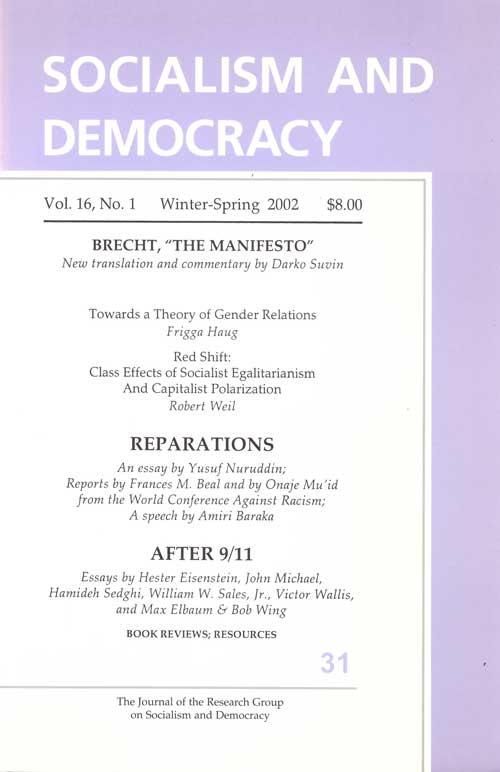Copies @ $5 may be ordered from Robert Roth, 210 West 10th Street (# 3D), New York, NY 10014.
And Then is a radical literary magazine which has been edited for the last fourteen years by Robert Roth and Arnold Sachar. Its publication is a labor of love for Roth, Sachar, and several close friends. Shelley Haven does the artistic design of the magazine, and Marguerite Bunyan does the type-setting.
The most recent issue of And Then contains several different kinds of texts. There are poems, drawings, and short prose narratives, as well as a letter written by a political prisoner and a review of Ellen Willis's Don't think, Smile: Notes on a Decade of Denial. The topics covered in this issue include class, race, gender, and sexual orientation. There are interesting pieces on family violence, education, and the role of historical memory. "Politics" is defined in a very broad way by the editors and contributors. They try to express the relationship between the personal and the political in the context of the objective character of capitalism. The poems and stories articulate the experiences of everyday life as these are transformed by the act of story telling.
One of my favorite pieces is a poem by Howard Pflanzer called "The Adjunct."
Here are two stanzas of the poem:
"Why are we
in this rich country
The envy of the world
The students
The teacher
The growth of knowledge
Stunted by a poisoned soil?
The colleges are to be cleansed
Of what
Of those who are different
Darked skinned
Un-American?
The privilege to keep
Their power and position
They fear the dark invading hordes
Swarming from unknown neighborhoods
Will overrun them Like a plague of rats.
The poem goes on to discuss both the plight of the adjunct, a kind of underpaid nomad, and the attitude of the ruling class toward our working-class students in all their diversity. Perhaps I have a particular fondness for this poem because I worked for twenty years as an adjunct teaching the kind of students Pflanzer describes, until I finally got a full-time position teaching the same students. He ends the poem by saying that he loves the students. I know that this may sound a little sentimental, but it is not.
As I read the poems and other pieces in And Then, I was reminded of the relationship between the metaphorical and referential functions of language. One can only represent the world by participating in a discourse. Poems and prose narratives tell stories while they connect with other poems and experiences, past and present. There is certainly something beyond the text, but we can only name this reality through discourse. The discourse of And Then is a discourse of desire, hope, pain, and faith in the human project of liberation. Humor and irony are central to this project.
I view And Then and Socialism and Democracy as parts of a common project of struggle, critique and reflection. Both operate in the space of the political; both address the human condition under capitalism, and both try to give life to our highest aspirations and desires for a truly human world.
Review by George Snedeker Sociology Department SUNY/College at Old Westbury

